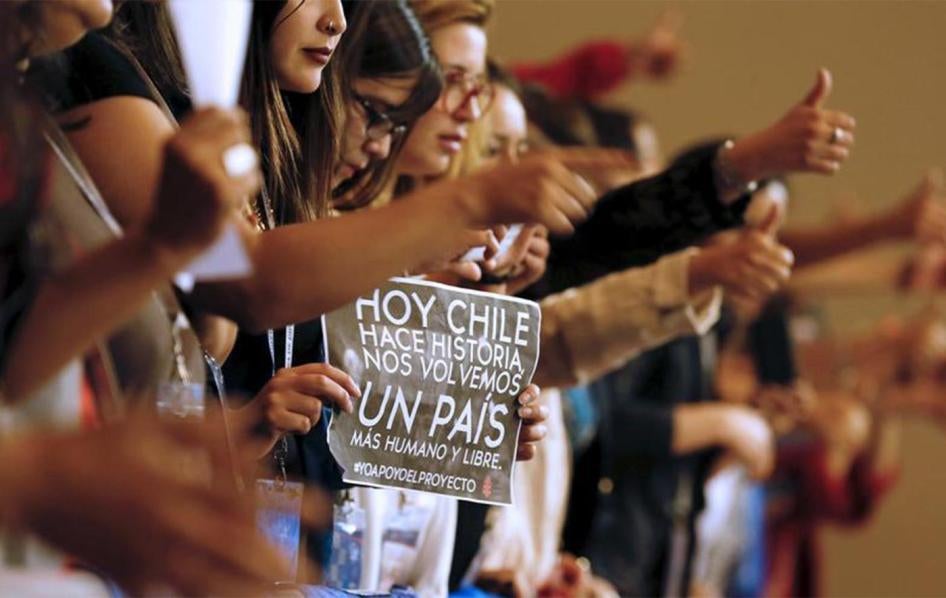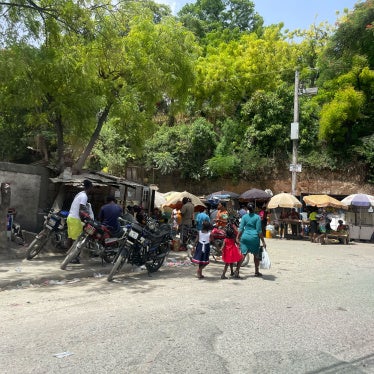(Santiago, Chile) – Last month, in a huge victory for Chile’s women, the Constitutional Court here upheld a long-awaited law that eases a total ban on abortion, raising hopes that other Latin American countries will soon reconsider their cruel restrictions on the procedure.
The new Chilean law, passed by Congress in August, decriminalizes abortion under three circumstances: if the life of the pregnant woman is at risk; if the pregnancy is the result of rape; or if the fetus will not survive.
Despite the modesty of those changes, the easing of the ban, proposed by President Michelle Bachelet in 2015, faced fierce resistance from the Catholic Church, evangelical groups and the right-wing opposition in Congress, whose challenges to the law were rejected by the court on Aug. 21.
Several other Latin American countries — Nicaragua, El Salvador, the Dominican Republic, Suriname, Haiti and Honduras — still ban abortion completely. In these countries, high maternal mortality rates from complications arising from unsafe illegal abortions, violence, poverty and weak judicial and health systems are all too common, as was the case with a 10-year-old girl with a mental disability who was raped and gave birth in El Salvador last month.
People may have moral, religious or medical disagreements on what defines the beginning of human life. But forcing women to continue pregnancies when they’re at risk of death, or carry to term an unwanted pregnancy resulting from rape, or to suffer through an unviable pregnancy, are harder to defend. Chile’s experience can be an example of how to reform laws that forbid women from terminating tragic pregnancies.
Although polls show that 70 percent of Chileans supported the law, a legal victory seemed unlikely. In 2008, the Constitutional Court had prohibited emergency contraception, and Chile’s Constitution requires the protection of prenatal life. Opponents of the bill felt confident they could sink it in the courtroom.
Perhaps more surprising, most of Chile’s elite opposed the bill. While on many issues they embrace globalization and often send their children to be educated abroad, at home they passionately defend regressive views toward women.
Against this backdrop, human rights groups and the government looked to Chile’s aspirations to integrate with the world. International law experts and human rights groups were called upon to participate in the process before the court. We were among them. Many supporters reminded the local elite that Chile was the only member of the Organization for Economic Cooperation and Development that still imposed a full ban on abortion.
Expert witnesses sought to undermine the opponents’ main argument, that a fetus has a right to life. We acknowledged the value of such a life but argued that a complete ban on abortion is an inefficient way of reducing the number of terminations compared with policies like affordable day-care programs and efforts to end gender-based violence. The criminalization of abortion moves women away from the government, hampering their access to maternity care and supportive policies.
We also argued that an absolute ban on abortion imposes an inhumane burden on women, an argument that had proved convincing in Colombia, where in 2006 a women’s rights coalition won a court battle to secure a right to abortion in circumstances similar to those now allowed in Chile.
It was also necessary to end the stigma associated with abortion. Civic institutions in Chile have invested much time and resources telling the stories of women who had abortions, to show the unfairness of treating them as criminals. Thanks largely to their efforts, the news media here is openly discussing the complex issues around abortion for the first time.
The joint venture between government and nongovernmental organizations to open the debate on abortion marks a human rights watershed in Chile. But much still needs to be done. Chile retains many unreasonable obstacles to legal abortion: for example, private hospitals can refuse to offer the procedure on religious grounds. Chile should also allow women to terminate if their health, not just their lives, are at risk.
In the meantime, Chile’s breakthrough should encourage other countries to reconsider their harmful and regressive laws banning abortion.









